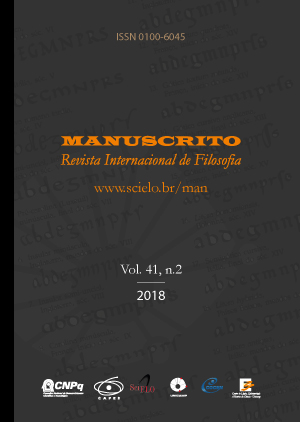Resumo
At the core of Kant’s theoretical philosophy lies the deduction of the categories: his effort to secure the distinctiveness of sensibility and understanding and to provide a necessary relation between the domains of these faculties. The argument for this claim is presented in two different versions – i.e., the A and B editions of the Critique of pure reason – and is one of the most puzzling in Kant’s corpus. The common view in the literature that considers the importance of the A-deduction and tries to present its structure is that it must be understood in the light of the B-deduction argument. I aim at contesting this view and offering an internal reconstruction of the A-deduction argument which reveals its unique methodology. The thesis advanced is that the A-deduction follows an analytical methodology and that this methodology does not allow the accomplishment of the task of the deduction stated in Kant’s effort. At first, Kant’s retrospect of the A-deduction (KrV, A XVI - XVII) is taken into account. After that, a consideration of the part of the argument described as ‘subjective deduction’ (KrV, A 94 - A 130) is carried outReferências
ALLISON, H. E. Kant’s transcendental idealism: an interpretation and defense. 2 ed. New Haven and London: Yale University Press, 2004.
ALLISON, H. E. Kant’s transcendental deduction: an analytical-historical commentary. New York: Oxford University Press, 2015.
ALMEIDA, G. A. “Dedução transcendental: o cartesianismo posto em questão”. Analytica, 3, pp. 135-156, 1998.
BARKER, M. "The proof structure of Kant’s ADeduction". Kant-Studien, 92, pp. 259–282, 2008.
FÖRSTER, E. (ed.). Kant's transcendental deductions: the three critiques and the Opus postumum. Stanford: Stanford University Press, 1989.
HENRICH, D. “The proof-structure of Kant's transcendental deduction”. The review of metaphysics, 22, pp. 640-659, 1969.
HENRICH, D. “Kant’s notion of a deduction and the methodological background of the first Critique”. In: E. Förster. (ed.) (1989), pp. 29-46.
HENRICH, D. “Systemform und Abschlussgedanke: Methode und Metaphysik als Problem in Kants Denken”. In: KANT UND DIE BERLINER AUFKLÄRUNG: AKTEN DES IX. INTERNATIONALEN KANT– KONGRESSES, 1., 2001, Berlin. Akten… Berlin: De Gruyter, 2001. pp. 94-115.
KANT, I. Critique of pure reason. Transl. by P. Guyer, New York: Cambridge University Press, 1998.
KANT, I. Prolegomena to any future metaphysics that will be able to come forward as science. Transl. by G. Hatfield, New York: Cambridge University Press, 2002.
KANT, I. Metaphysische Anfangsgründe der Naturwissenschaft. Berlin: de Gruyter, 1968; Anmerkungen, Berlin/New York: de Gruyter, 1977.
LONGUENESSE, B. Kant and the capacity to judge. Princeton and Oxford: Princeton University Press, 2000a.
LONGUENESSE, B. “Kant’s categories and the capacity to judge”. Inquiry, 43, pp. 91-110, 2000b.
PATON, H. J. Kant’s metaphysics of experience. 4. ed. New York: Macmillan, 1965.
PERIN, A. "A verdade como um problema fundamental em Kant". Trans/Form/Ação, Marília, 33, pp. 97-124, 2010.
ROBINSON, H. “The transcendental deduction from A to B: combination in the threefold synthesis and the representation of a whole”. The southern journal of philosophy, 25, pp. 45-61, 1987.
SASSEN, B. (ed.). Kant’s early critics: the empiricist critique of the theoretical philosophy. New York: Cambridge University Press, 2000.
STRAWSON, P. F. The bounds of sense. New York: Routledge, 1966.

